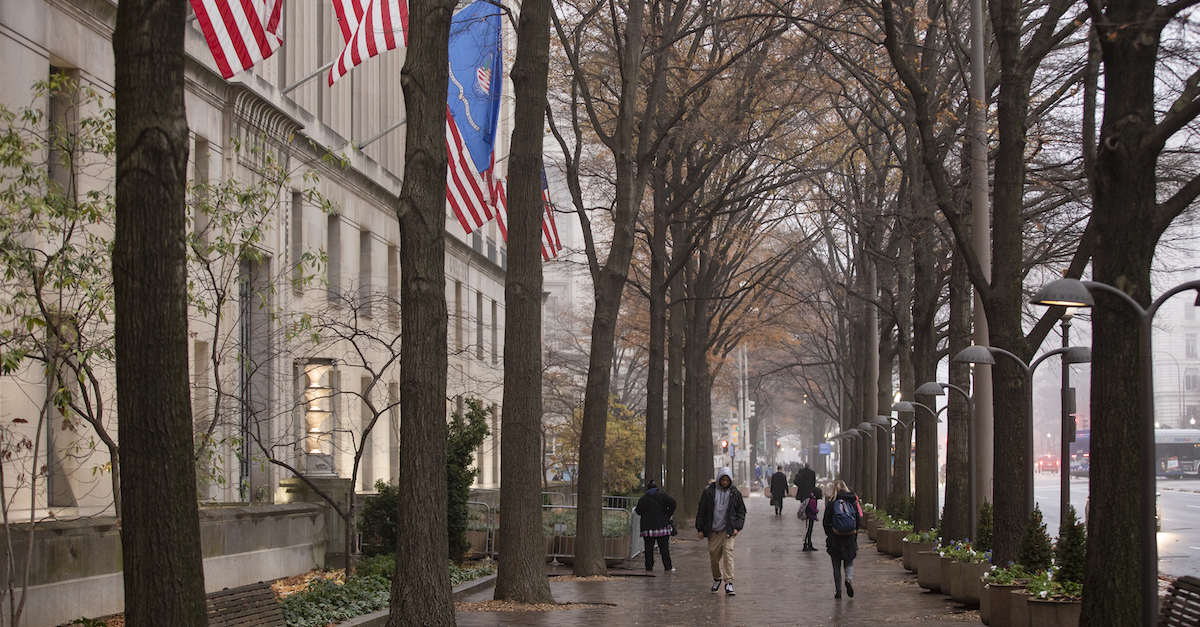
People walk past the Justice Department building on a foggy morning on December 9, 2019 in Washington, DC. (Photo by Samuel Corum/Getty Images)
A sharply divided panel of three federal appeals court judges has upheld a conviction of a legal permanent U.S. resident that relied on information gathered from warrantless surveillance of a non-citizen living abroad.
In a 163-page ruling issued Wednesday, U.S. Court of Appeals for the Tenth Circuit Judges Scott Matheson, a Barack Obama appointee, and Allison Eid, a Donald Trump appointee, found that information collected from warrantless surveillance of non-U.S. citizens living abroad did not violate the constitutional rights of Jamshid Muhtorov, a legal permanent resident of the U.S. and political refugee from Uzbekistan.
The judges also found that a nearly six-and-a-half year delay between Muhtorov’s arrest and trial did not violate his Sixth Amendment right to a speedy trial.
Muhtorov, a political refugee from Uzbekistan and legal permanent resident of the U.S., was convicted in June 2018 of conspiracy to provide material support to a designated foreign terrorist organization. According to prosecutors, he had pledged loyalty to the Islamic Jihad Union and had planned to travel to Turkey to join the organization. When he was arrested at a Chicago airport in December 2011, investigators found incriminating videos on his phone, including instructions on how to make explosive devices and, according to the court, “graphic images of jihadists beheading captured men,” and nearly $3,000 in cash.
Muhtorov appealed his conviction, arguing that evidence collected and used against him was, essentially, fruit from the poisonous tree of the warrantless surveillance of a non-U.S. citizen pursuant to Section 702 of the Foreign Intelligence Surveillance Amendments Act of 2008. Muhtorov’s communication with that non-citizen formed the basis for a warrant under the Foreign Intelligence Surveillance Act (FISA), and evidence collected under that warrant was used to convict him.
Muhtorov argued that the Section 702 surveillance violated the Fourth Amendment, and that Section 702 itself violates the Constitution. He also argued that he should have been given access to classified information that supported the government’s surveillance under Section 702 and FISA, and that the government should have disclosed its surveillance techniques. Muhtorov also argued on appeal that his Sixth Amendment right to a speedy trial was violated because more than six years passed between his arrest in January 2012 and his conviction in June 2018, during which time he was incarcerated.
Two of the three judges on the panel rejected all of Muhtorov’s arguments, finding that that the Section 702 surveillance was lawful, and that Muhtorov’s trial was not unreasonably delayed.
In finding that the Section 702 surveillance didn’t violate Muhtorov’s Fourth Amendment rights, the majority essentially accepted the government’s version of events that “the evidence Muhtorov sought to suppress was not obtained or derived from any queries associated with him.”
The court also rejected Muhtorov’s argument that Section 702 violates Article III of the Constitution and the separation of powers.
“Under Section 702, the Foreign Intelligence Surveillance Court (“FISC”) does not issue individualized warrants,” the majority wrote. “Instead, it approves procedures in advance under which the government conducts warrantless foreign intelligence surveillance. Although the FISC’s role under Section 702 is novel, it comports with Article III and the separation of powers.”
As to the six-plus years between Muhtorov’s arrest and trial, the majority said that although the delay was “concerning,” the “quantity and nature of the discovery, and the overall good faith and diligence of the government and the district court in bringing this case to trial” countered any potential Sixth Amendment violation.
Senior U.S. Circuit Court Judge Carlos Lucero, a Bill Clinton appointee, strongly disagreed with the majority.
Lucero called the ruling an “extreme departure” from “accepted norms of constitutional and procedural law affecting this case.” Much of the dissent focused on the six years and four months that elapsed between Muhtorov’s arrest and trial, with Lucero concluding that it did not meet the constitutional requirements for a speedy trial.
“The right to a speedy trial does not allow the government to sit on its hands for 46 months before it begins to perform its duties,” Lucero wrote in a 48-page dissent. “That Muhtorov languished in jail under an unresolved charge while the government actively avoided its constitutional duties is anathema to the Sixth Amendment speedy trial guarantee.”
Lucero writes that he would have vacated the conviction on speedy trial grounds.
Lucero also said he had “serious concerns” about his fellow judges’ analysis of the Fourth Amendment and Article III issues, and says the majority opinion “avoid[s] difficult constitutional questions by accepting as true unsupported factual assertions that the government makes in its brief on appeal.”
The majority opinion addressed Lucero’s concerns in a footnote, insisting that it “conducted a careful and thorough de novo review of the classified and public records and disagree with the dissent’s unfounded assertions.”
The American Civil Liberties Union, which represented Muhtorov, said the decision was wrong, and it “endangers Americans’ protections” against government surveillance.
“We don’t give up bedrock Fourth Amendment protections when we communicate with family, friends, and colleagues abroad, contrary to the court’s ruling today,” Patrick Toomey, senior staff attorney with the ACLU’s National Security Project, said Wednesday in a statement. “Under Section 702, the government for years has amassed our online messages, chats, and emails without a warrant, violating the constitutional rights of countless Americans, including Mr. Muhtorov. Mass surveillance threatens all of us. The FBI and NSA don’t have a free pass to seize and sift through our most sensitive communications, and we will keep fighting to ensure they can’t violate the Constitution.”
Read the court’s ruling, below.
[Image via Samuel Corum/Getty Images]